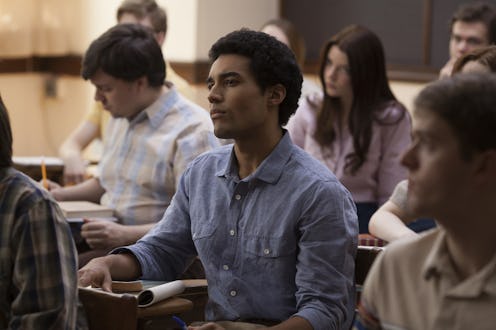Entertainment
'Barry' Gets This Frustrating Situation So Right

Early on in the Netflix movie Barry, a young President Barack Obama, played by Devon Terrell, is faced with a disturbing question after talking about the correlation of slavery and economic position in America. "Why does everything always got to be about slavery?" a white student asks. For me, watching the film, this was the moment that made me press pause and think, "Oh, here we go," because I know exactly what it's like to be the only Black student in a classroom full of White classmates and be faced with this type of question.
Although Barry is about the early college life of Obama and his years spent at Columbia University in 1981 New York, I could connect to it in a major way. The film, directed by Vikram Gandhi, theorizes on how Obama's biracial identity affected him during his formative years, and how the pull between the two races took a toll on his personal identity — like when, as in the classroom scene, he's the only Black person in a room and is forced to be an expert on race by his White classmates.
PHOTO
Being a product of both Prairie View A&M University, a historically black college (HBCU), and the University of Southern California, a predominately white institution (PWI), I can totally relate to Barry's classroom scene. The slavery question, posed by the character Thad (Sawyer Pierce), is a question that I've been faced with in my own classroom experience, and it's a question that the person asking doesn't seem to realize is a product of racial privilege. We don’t live in a post-racial society, but we do live in a society where many people don't want to appear racist or racially insensitive, yet come across this way regardless. "It's 1981, dude, get over it already," Thad says in a scene later in the movie, when Barry confronts him about his viewpoint on slavery.
When I see White people trip over themselves in order look enlightened, when in actuality they are belittling Black people with ignorant questions, I can't help but feel patronized. Whenever I am the only Black person in the room and get this type of question, I feel uneasy; I feel challenged to always speak up for my cultural experience, but hate myself if I remain silent. What makes the situation even more challenging is the fact that I'm a first generation Nigerian American. Getting the questions about slavery is one thing, but it's worse when I get asked things like, "What part of civilized Africa are your parents from?" and "Did they ride lions to school?"
PHOTO
These questions offend me, and they make me feel anxious. In America, we are conditioned to believe as Black people that we are not as smart as White people. When you're in a room surrounded by people who are perceived to be more intelligent than you are, there is an unwanted pressure that rises up within you. One sad lesson that I take from constantly being in this situation is that in this world, despite whether I further my education or advance in the workforce, my skin color will always precede me. People will automatically have thoughts about who I am because of my race, culture, and name. I know I can stand tall and be confident in who I am, but that doesn't erase the fact that these preconceptions still exist.
That's why the classroom scene in Barry is so important. The question posed by Obama's classmate sets the precedent for the rest of the movie and shows viewers the constant struggle this young, fictional Obama has with his identity. This one encounter subconsciously puts him on edge when it comes to figuring out his identity as a mixed race man, and it's all too relatable for people like myself who've been in that situation so many times before.